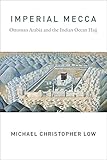Imperial Mecca : Ottoman Arabia and the Indian Ocean Hajj / Michael Christopher Low.
Material type: TextSeries: Columbia Studies in International and Global HistoryPublisher: New York, NY : Columbia University Press, [2020]Copyright date: ©2020Description: 1 online resourceContent type:
TextSeries: Columbia Studies in International and Global HistoryPublisher: New York, NY : Columbia University Press, [2020]Copyright date: ©2020Description: 1 online resourceContent type: - 9780231549097
- 297.3/524 23
- BP187.3 .L69 2020
- online - DeGruyter
| Item type | Current library | Call number | URL | Status | Notes | Barcode | |
|---|---|---|---|---|---|---|---|
 eBook
eBook
|
Biblioteca "Angelicum" Pont. Univ. S.Tommaso d'Aquino Nuvola online | online - DeGruyter (Browse shelf(Opens below)) | Online access | Not for loan (Accesso limitato) | Accesso per gli utenti autorizzati / Access for authorized users | (dgr)9780231549097 |
Browsing Biblioteca "Angelicum" Pont. Univ. S.Tommaso d'Aquino shelves, Shelving location: Nuvola online Close shelf browser (Hides shelf browser)

|

|

|

|

|

|

|
||
| online - DeGruyter The Nose and Other Stories / | online - DeGruyter Getting Price Right : The Behavioral Economics of Profitable Pricing / | online - DeGruyter Japan's New Regional Reality : Geoeconomic Strategy in the Asia-Pacific / | online - DeGruyter Imperial Mecca : Ottoman Arabia and the Indian Ocean Hajj / | online - DeGruyter Histories of Racial Capitalism / | online - DeGruyter A Double Life / | online - DeGruyter International Policy Rules and Inequality : Implications for Global Economic Governance / |
Frontmatter -- Contents -- Illustrations -- A Note on Sources, Transliteration, and Dates -- Acknowledgments -- Introduction Between Two Worlds An Ottoman Island Adrift on a Colonial Ocean -- PART ONE Extraterritorial Frontiers -- ONE Blurred Vision The Hijaz and the Hajj in the Colonial Imagination -- TWO Legal Imperialism Foreign Muslims and Muslim Consuls -- PART TWO Ecologies of Empire -- THREE Microbial Mecca and the Global Crisis of Cholera -- FOUR Bedouins and Broken Pipes -- PART THREE Managing Mobility -- FIVE Passports and Tickets -- SIX The Camel and the Rail -- Epilogue Legacies and Afterlives -- Notes -- Abbreviations -- Index
restricted access online access with authorization star
http://purl.org/coar/access_right/c_16ec
With the advent of the steamship, repeated outbreaks of cholera marked oceanic pilgrimages to Mecca as a dangerous form of travel and a vehicle for the globalization of epidemic diseases. European, especially British Indian, officials also feared that lengthy sojourns in Arabia might expose their Muslim subjects to radicalizing influences from anticolonial dissidents and pan-Islamic activists. European colonial empires’ newfound ability to set the terms of hajj travel not only affected the lives of millions of pilgrims but also dramatically challenged the Ottoman Empire, the world’s only remaining Muslim imperial power.Michael Christopher Low analyzes the late Ottoman hajj and Hijaz region as transimperial spaces, reshaped by the competing forces of Istanbul’s project of frontier modernization and the extraterritorial reach of British India’s steamship empire in the Indian Ocean and Red Sea. Imperial Mecca recasts Ottoman Arabia as a distant, unstable semiautonomous frontier that Istanbul struggled to modernize and defend against the onslaught of colonial steamship mobility. As it turned out, steamships carried not just pilgrims, passports, and microbes, but the specter of legal imperialism and colonial intervention. Over the course of roughly a half century from the 1850s through World War I, British India’s fear of the hajj as a vector of anticolonial subversion gradually gave way to an increasingly sophisticated administrative, legal, and medical protectorate over the steamship hajj, threatening to eclipse the Ottoman state and Caliphate’s prized legitimizing claim as protector of Islam’s most holy places. Drawing on a wide range of Ottoman and British archival sources, this book sheds new light on the transimperial and global histories traversed along the pilgrimage to Mecca.
Mode of access: Internet via World Wide Web.
In English.
Description based on online resource; title from PDF title page (publisher's Web site, viewed 27. Jan 2023)


